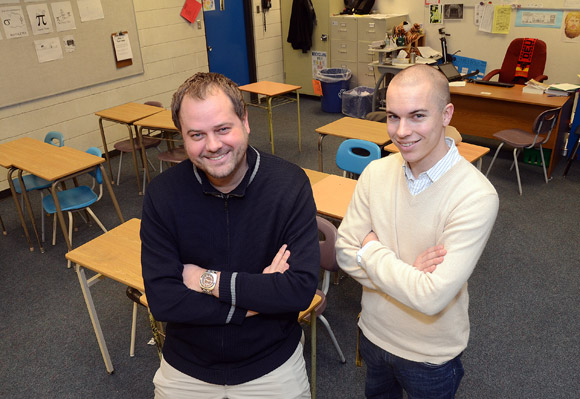
UBC alumni and Okanagan Mission Secondary School senior math teachers Paul Janke, left, and Graham Johnson have implemented a flipped classroom where the students watch their lesson online at home and they discuss what they learned in class the next day.
Flipped classrooms allow students more time with teachers
Graham Johnson and Paul Janke take a radically different approach to teaching than the established norm.
The two Okanagan Mission Secondary School senior math teachers have implemented a “flipped classroom” system of learning.
Flipped learning is where a lesson is recorded, put online and students watch the lesson at home and then discuss it in class the following day. The two University of British Columbia alumni are the first in the Canadian public school system to try such an approach to teaching.
“The kids go home and watch it as homework,” says Janke. “They get the teaching part at home, and when they come to class it allows them more time to work on it with other students or a teacher.”
Johnson says the concept affords much greater flexibility for the students and teachers.
“We can meet with every one of our learners,” says Johnson, adding the online lessons are around 15 minutes long, which studies have shown to be the optimum time for a teen to focus on a subject.
“It gives us the flexibility to better meet their needs. It allows the teacher to talk to each individual kid.”
Although met with some trepidation when implemented, the flipped classroom idea quickly caught on and students, parents, the school district and other teachers now embrace the concept.
Having the lesson online also allows students who may be struggling to rewind sections they don’t fully understand, while high-achievers can work at a faster pace. The students can then bring up any difficult areas with their teachers one-on-one in the classroom.
Janke and Johnson are currently in the Master of Education program at the Okanagan campus and their supervisor, Robert Campbell, supports the flipped class concept.
“It’s a really effective way to use the students’ time,” says Campbell, who is an associate professor with the Faculty of Education. “If you are going to give them homework, this is the way to do it.”
One question being asked is whether the flipped concept could work on courses other than math. Campbell believes it can.
“I suspect it will work very well in many other areas,” says Campbell, adding with the growing importance of electronic learning and information gathering, the education system is “on the threshold of some big changes.”
Graham and Janke are planning to host a conference on flipped classes next June in Kelowna.
— 30 —